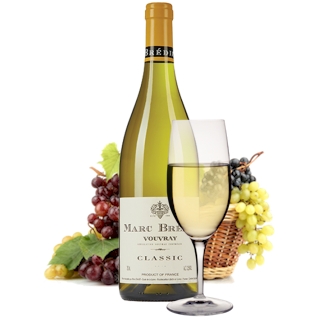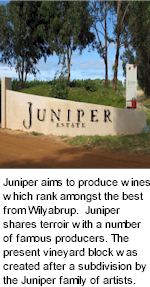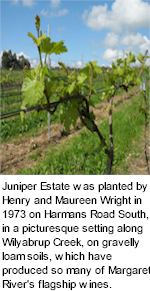


Juniper is one of the oldest vineyards in the Wilyabrup area. No subregion has been historically more important in the success of Margaret River than Wilyabrup, where the first vineyards were planted and wineries built and which continues to be home to a disproportionately large number of famous, usually small, vineyards. Juniper Estate was planted by Henry and Maureen Wright in 1973 on Harmans Road South, in its picturesque setting along the Wilyabrup Creek. The vineyard grows on the gravelly loam soils, which have produced so many of the Margaret River wines which now command Australia-wide and international recognition. The land has a rich history. In the 19th century the road from Busselton to the south ran through what is now the vineyard and forded the Wilyabrup Creek (hence the “Crossing” range of wines). It was then part of the group settlement scheme in the years between the World Wars.

Juniper aims to produce Estate wines which rank with the best wines to come from Wilyabrup. The area has established itself over more than 30 years as the most successful sub-region of Margaret River, particularly for red wines. Juniper shares terroir with a number of famous producers. The present vineyard block was created by subdivision by the well-known Western Australian artist family, the Junipers after whom it is now named. The original Margaret River vineyards were planted without irrigation. Wright’s vineyard was no exception and the original 21 acres of Cabernet Sauvignon, Shiraz, and Semillon and Riesling are dry grown. Dry land viticulture is now highly regarded for the depth of flavour it produces in the grapes. The relative lack of water during the dry ripening months is thought to concentrate flavour into lower yields of intensely flavoured fruit.
No quality wine can be made without quality fruit, which requires the utmost care and attention in the vineyard, where re-trellising, restoring and planting, and canopy management all play their part in ensuring the finest quality fruit. The vineyard is hand pruned and the grapes are hand picked at harvest. Two acres of Petit Verdot, Merlot, Cabernet Franc and Malbec were added in 1999, with the aim of extending the flavours of future Estate Cabernets. All the new plantings are also dry grown.
The Estate reds are true regional wines with minimal influence from the winery, and are a further example of Wilyabrup’s proven ability to produce wines of the highest quality. Traditionally, Margaret River wines have come from low-yielding vines on small vineyards and prices have been commensurate with their premium quality.

The Crossing range of wines aims to offer distinctively Margaret River wines to the consumer at affordable prices. To do this Juniper buys fruit from other small, carefully-managed vineyards and (in the Crossing reds) blends it with estate fruit – thereby lifting the quality of the Crossing wines and providing the winemaker with a vehicle to ensure that only the very best fruit is used for the Estate wines.
The proprietors of Juniper purchased the Higher Plane vineyard in Forest Grove with a view to supplementing their growing requirement for fruit for the Juniper Crossing range. The property is 49 hectares in size, with 25 hectares presently planted, the majority north facing. The north facing aspect increases sun exposure for the vines and also reduces stress from the south winds on the vines, useful in this southern part of the Margret River Region. There are three streams that enter the property and a 60-megalitre dam has been constructed. The soil is of the Wilyabrup type or Forest Grove duplex soils on a clay sub-soil which is the ideal soil type for wine production in the region. These soils have a significant gravel component which aids drainage and reflects heat back onto the vines in the evening. The sandy loam component of the soil gives it its water holding capacity and in combination with the high gravel content, tends to promote low vigour.
Control of the winemaking process is critical in making premium wine and Juniper has a state of the art winery and a temperature controlled barrel room built in 1999. The winery, with modern refrigeration and storage equipment, ensures optimum treatment of our fruit. Winemaking is aimed towards the Margaret River style of depth and elegance, with extensive use of new oak giving the wines added complexity. Wine is stored in oak in the air conditioned barrel room on the property until bottling, and then in bottles until release.
